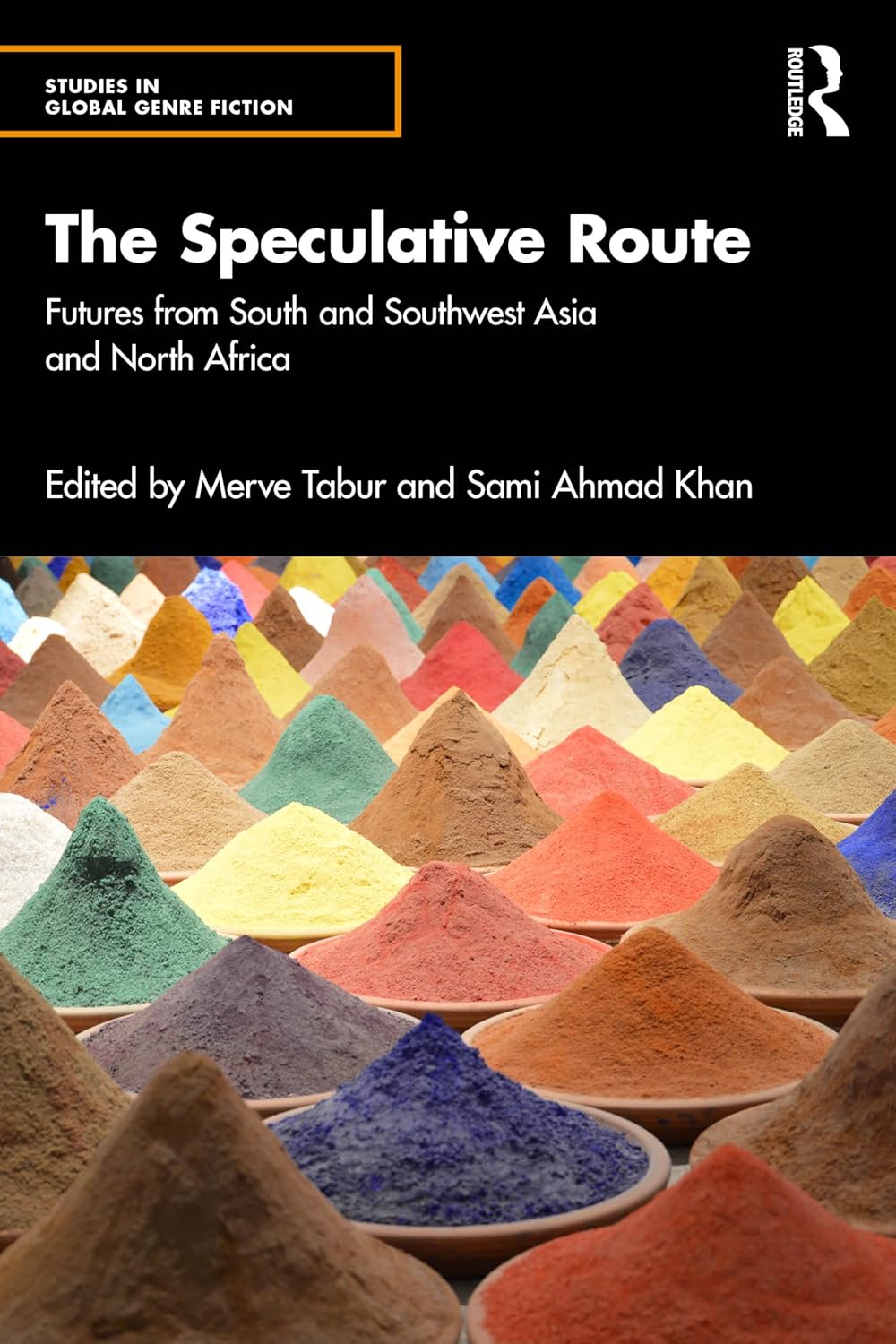
The Speculative Route
Futures from South and Southwest Asia and North Africa
Merve Tabur and Sami Ahmad Khan (eds.)
The Speculative Route explores speculative traditions and science fictional modes across South and Southwest Asia and North Africa (SSWANA), examining their historical connections, inter and intra-regional entanglements, overlaps, and differences.
Conceptualizing science fiction and fantasy (SFF) as a mode rather than genre, this volume challenges the putative boundaries between literary and genre fiction through critical studies and essays focusing on SFF from Bangladesh, Egypt, India, Iran, Pakistan, Palestine, Sri Lanka, and Turkey. It demonstrates the ways in which science fictional modes of thinking and imagination function as critical tools for addressing social, cultural, and political issues beyond genre conventions and expectations. Bringing together articles by leading scholars of SFF and think-pieces by acclaimed authors of contemporary SF, this volume focuses on central themes such as the relationship between aesthetics and politics, alterity, worldbuilding, memory, trauma, colonialism and decolonization, ecology, gender, religion, and mythopoetics. It engages with the past, present, and future of speculative traditions in SSWANA, and compares the visions that emerge from these seemingly disparate––but historically connected––entities.
Part of the Studies in Global Genre Fiction series, this volume will be of great interest to academics, students, and practitioners in the fields of genre studies (notably, SF, SFF), comparative literature, media and popular culture, area studies, postcolonial studies, and future studies, as well as to readers who are interested in exploring SFF works from the Global South.
Merve Tabur is lecturer in Comparative Literature at Utrecht University and researcher at CoFutures.
Sami Ahmad Khan is a writer, academic, and documentary producer. He teaches at Jawaharlal Nehru University, India.
‘The Speculative Route is a wide-ranging exploration of science fiction from the Indian Ocean to the Mediterranean. It connects the marvelous literatures of countries like India, Iran and Egypt, while reaching deep into imagined pasts and possible futures. Merve Tabur and Sami Ahmad Khan will take you on a fantastic voyage across time and space, opening up exciting new worlds along the way.’
Jörg Matthias Determann, Professor at Virginia Commonwealth University in Qatar and author of Islam, Science Fiction and Extraterrestrial Life
‘The Middle East and South Asia have been talking to each other since antiquity, a conversation expressed through trade, conflict, exchanges of knowledge and culture, and perhaps most importantly, stories that express dreams of desired worlds. That conversation has been interrupted – but not shut down – by colonialism. Now, this volume creates a space for these two regions to resume the conversation in the realm of the utopic imagination, examining both similarity and difference across linguistic, nationalist and oppressed-oppressor boundaries, and opening the door to further cross-pollination. The speculative imagination of the Middle East and South Asia, as revealed through scholarly works and insightful think-pieces by writers from these regions, is polyphonic, kaleidoscopic and alive. An invaluable contribution to the literature on collective dreaming for a desired world.’
Vandana Singh, speculative fiction writer and physicist.
‘This anthology of essays, carefully edited by Merve Tabur and Sami Ahmad Khan, not only addresses spec-fic from much of Asia and Africa, it also spans a remarkable range of imaginative perspectives. It is a much-needed effort that will surely be of interest and benefit for both academics as well as thoughtful writers.’
Anil Menon, author of The Coincidence Plot
Table of Contents
List of contributors
Series Editors’ Preface
Introduction: “The Spice Must Flow”
Merve Tabur and Sami Ahmad Khan
I CRITICAL ESSAYS
I.I Future Pasts
1 Suparno Banerjee, “Science Fictionalizing the Epic: Retelling the Ramayana in the Age of Science”
2 Engin Kılıç, “Khent (The Fool): An Armenian Utopian Vision Compared to Ottoman-Turkish Utopias”
3 Ada Barbaro, “Other Places, Upside-down Places: Narrating the Nakba (1948) from the Future, Palestine Looks to the Future to Contest the Present”
I.II Urban Futures
4 Nat Muller, “Maha Maamoun’s 2026: Cracks in the Future of the Global City”
5 Ezgi Hamzaçebi, “Istanbul’s Speculative Futures: Transformation of the City and the Sense of Citizenship”
6 Saba Pirzadeh, “Environmental Futurities and Solastalgia in Global Speculative Fiction”
I.III Rethinking Gendered Presents
7 Tehmina Pirzada, “Beyond Capes and Khans: Social Retrofuturism in Select Female Superhero Narratives”
8 Zahra Jannessari Ladani, “Utopian Mentalities and the Dystopian Future in Zoha Kazemi’s Humanoid”
9 Sabiha Huq, “Bangla Science Fiction: A Gendered Landscape”
II THINK PIECES
10 Sonia Sulaiman, “The Reality and the Dream: The Palestinian Speculative”
11 Funda Özlem Şeran, “The Tech-Ignorant’s Guide to Science Fiction”
12 Ahmed Naji, “On Egyptian SFF”
13 Zoha Kazemi, “Keeping it Close to Home: A Think-piece about the New Iranian Speculative Fiction Movement”
14 Manjula Padmanabhan, “Space, Time and Otherness”
15 Navin Weeraratne, “Writing Sri Lankan Science Fiction”
16 Samit Basu, “On Indian SFF”
17 Usman T. Malik, “An Ode to The Music in Our Bone Marrow: Revisiting Pakistani and South Asian Science Fiction”
18 Yudhanjaya Wijeratne, “Infinite Games in Someone Else’s Sandbox”
19 Priya Sarukkai Chabria, “The Same Life in My Blood”
20 Saad Z. Hossain, “South Asian World Building in Science Fiction and Fantasy”
21 A Roundtable of SSWANA Writers: The Speculative South
PURCHASE OPTIONS
©CoFutures, 2024
